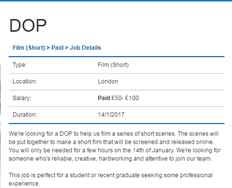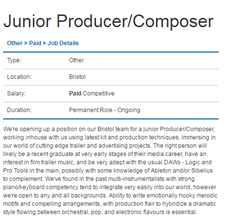Journal of Research into Progression Routes and Opportunities
- kerriejack1
- Jan 4, 2017
- 7 min read
3rd January 2017
With a Level 3 degree certificate in TV and Film, some possible jobs that I could move on to could be:
Camera Operator
Lighting Technician
Film/ TV Director
Film/ TV Producer
Runner
Film/ TV Broadcaster
Floor Manager
Editor
Director of Photography (D.O.P)
Audio Mixer
Sound Technician
These are a few jobs I found for a new college graduate with a degree in TV and Film. The Junior Producer and Composer has a good opportunity for a person looking for a job in TV and Film and grabs my attention because it seems to be the most like an actual full time career in the Film industry compared to the other two. They need some experience and they expect the person to be new in the role, meaning it can give young producers a good start in their career for their future in the media industry.
I am not completely sure what I want to do but would find myself comfortable in any of these positions. The least comfortable I would possibly be able to work in would be a lighting technician because I feel I know the least in this subject area. Runner would also be a starting job for a TV and Film company but it depends on the level you enter with and what they see in you, meaning you could be promoted to a higher job before ever being a runner.
4th January 2017
Editor

In inquiry to the job of being an editor, I e-mailed off to the Yogscast with an e-mail asking some questions on how they got to where they are now and if they have any advice for myself. I feel that an editor would be one of the easier jobs for myself to get into for a starter job and that I could perform well in. I also sent an e-mail to the US company Rooster Teeth to see what information they could provide me with.
Qualifications that are relevant are:
Communication and media studies.
Fine art/visual art.
Graphic design.
Information technology/multimedia.
Photography/film/television.

You'll be expected to have pre-entry experience and will need to show evidence of having worked on film or video production or post-production, preferably via an up-to-date and well prepared show-reel.
In this job found on Indeed.com they are expected to have previous editing work, being able to use Adobe and someone who can edit at a fast pace. This means that they are searching for someone with past experience in editing and can edit to a somewhat professional standard. This can also continue to say that they look for someone who can colour grade, meaning they have to have creative visionary and able to make a scene look professional.
For myself, I have studied Graphic design as a GCSE, Media Studies as a BTEC and now am carrying out a course for a Diploma Certificate in TV and Film. This gives me a good possibility of being an editor in the future and will be a job that I will be keen to do. To develop my skills for this job, I would have to gather much more experience and put together a show reel of my work, showing how good my editing skills are. I would also have to learn more about colour grading , something I will be looking into for the future.
Reference
"Film/Video Editor Job Profile | Prospects.Ac.Uk". Prospects.ac.uk. N.p., 2017. Web. 4 Jan. 2017.
6th January 2017
Producer
I did some research on what it is like to be a producer. A producer plays an integral role where you see the project over until completion. They work closely with with the director and production staff to get their creative skills across and presented correctly. You will have to arrange the funding and keep it within the budget.
This job is one that requires work experience and that any opportunities shown must be exploited as this is what this sector expects. Try to have a significant track record in the area to get the best employ-ability rates possible because most will have a track record.
Qualifications that will increase your chances as a producer are:
broadcasting
communication and media studies
information technology/multimedia
photography/film/television.
"Postgraduate qualifications are not required for entry into the profession. However, courses containing practical work experience in production may increase your chances of success in a notoriously competitive environment. Be aware that entry to these programmes is competitive and most require some previous experience so that you can give evidence of your practical skills and your work."
Reference: In-text: ("Television/Film/Video Producer Job Profile | Prospects.Ac.Uk")
"Television/Film/Video Producer Job Profile | Prospects.Ac.Uk". Prospects.ac.uk. N.p., 2017. Web. 6 Jan. 2017.

This job is more of a work experience role, wanting someone to help organise files and they are looking for someone who can write emotionally to put impact into the music videos and advertising projects they have to work on. This job role is permanent which is a good start for a recent graduate to progress in their work experience.
This seems to be a more difficult role to get into as it requires much more attention and time of your own to be put towards it. They take much more of their time up with this job as they are one of the most important roles to exist. I feel that I could take up this job but the importance of this role may affect the way I would perform and would take time to get used to as I particularly don't play this role.
Camera Operator
Looking into the role of a camera operator, they interact with the producer, director, sound recordist, lighting technicians, actors and more people on set. This means that a camera operator has to know where everyone else is and what everyone else is doing to pull their shot off professionally. They have to rehearse their shots to get them as smooth as possible.

"Work shadowing can provide useful experience and can help develop contacts in the industry. Working as a runner can be a useful entry point, but it is vital to have a career plan and to keep your overall career aims in mind." Prospects claims, meaning that becoming a camera operator in first entry is a rare possibility. They say that technical skills and the correct work experience are far more important than formal qualifications and that you are most likely to start out as a camera assistant.
Because a degree or PHD isn't technically needed, these are some qualifications that provide you with increased chances to becoming a camera operator. These are:
Journalism
Media Production
Media Studies
Performing Arts
Photography, Film or Television.

This job is searching for someone with a good eye for detail, flexible, creative and patient. They also look for someone with good communication skills.
This role has a clear possibility for me to become as I have a BTEC in Media Studies and am currently carrying out the course of Film and TV. This is also a job that I would find myself working comfortably with but would have to work up to because of how the companies manage this role. I feel that I would be a dedicated Camera operator but have my choices open in case I decide to become something other than a camera operator or if they need my skills in any other areas.
References
"Camera Operator | Creative Skillset". Creativeskillset.org. N.p., 2017. Web. 6 Jan. 2017.
"Television Camera Operator Job Profile | Prospects.Ac.Uk". Prospects.ac.uk. N.p., 2017. Web. 6 Jan. 2017.
7th January 2017
Director of Photography (D.O.P)
I looked at the role of a D.O.P, seeing that they spend much of their time interacting with the technical and creative side of the production team; camera operators, lighting technicians, media make-up. This means that the D.O.P has to have creative visionary to present them with the information need, allowing them to set us the scene as accurate as possible to the producer's visionary.

Once again, you don't need degrees but these are recommended;
Still Photography
Film or Television
Media Studies
Performing Arts
Media Production

This job is looking for a director of photography who is creative, hardworking and reliable. In comparison with what I have researched, this is an accurate representation of the skills they wish for in this role.
Once again, I feel this is a role I could become, having studied Media and taking a course in Film and TV. I feel this would also need some work for me to do effectively because although I have a photographer's eye, it is much more difficult in presenting the visionary of someone else and getting it correct. I feel that I would be comfortable in this role after some experience and better knowledge in the work area.
References
"Television Camera Operator Job Profile | Prospects.Ac.Uk". Prospects.ac.uk. N.p., 2017. Web. 6 Jan. 2017.
10th January 2017
Today, I have looked at the role of a Floor Manager. I learnt that they spend their time organising the cameras, props and cast to safe areas and to ensure that the equipment works. They need to have good organisational skills and communication skills to direct people to safe places.

You can enter this area of work without degree, but the following subjects may be particularly helpful:
Media Studies
Drama/Theatre Studies
Photography/Film/Television
Most floor managers actually rely on their work/practical experience to get them into their job because this is essential. They have to be organised and assertive, myself being organised but not the most assertive. I would have to work on my assertiveness with others to get the message across as its best potential. I feel this is a role that is open for options to me, having studied media and taking a course in TV and Film. I feel that I could organise well and do this effectively but would need to complete some work experience carrying out this role to be able to put forward my knowledge as this role and the experience I have gained from taking on this role.
12th February 2017

University courses provide many opportunities for the future in the area of TV and Film. They allow you to gather many more skills and knowledge in the area you would like to work in a presents you with opportunities to work with clients and businesses to put yourself into the working world. It provides you with numerous amounts of work experience and presents you with many opportunities.
Universities with higher run courses search for people with distinction stars at diploma level BTEC or the equivalent to it. The courses are normally also run by being paid for by the student. With the skills gathered through the three years of university, you will have a better qualification in TV and Film and allows you to get better jobs and higher employability rates because of the amount of experience you have gained.
This is a progression route I could see myself doing if I don't or aren't able to get a job straight away. It seems like a route that would help me develop my skills and provide me with much more knowledge in the areas I want to improve.
References
"Television Floor Manager Job Profile | Prospects.Ac.Uk". Prospects.ac.uk. N.p., 2017. Web. 10 Jan. 2017.
"Job Search | One Search. All Jobs. Indeed". Indeed.co.uk. N.p., 2017. Web. 23 Jan. 2017.
Anon, (2017). [online] Available at: https://www.solent.ac.uk/courses/undergraduate/film-production-ba?year=2017 [Accessed 22 Mar. 2017]






















Comments